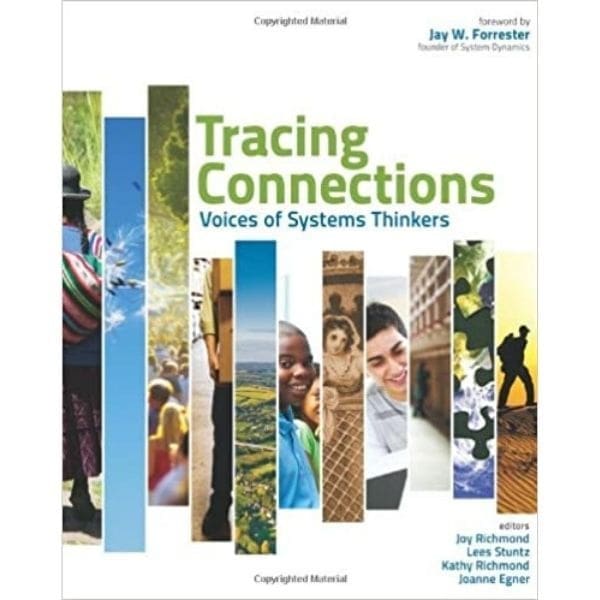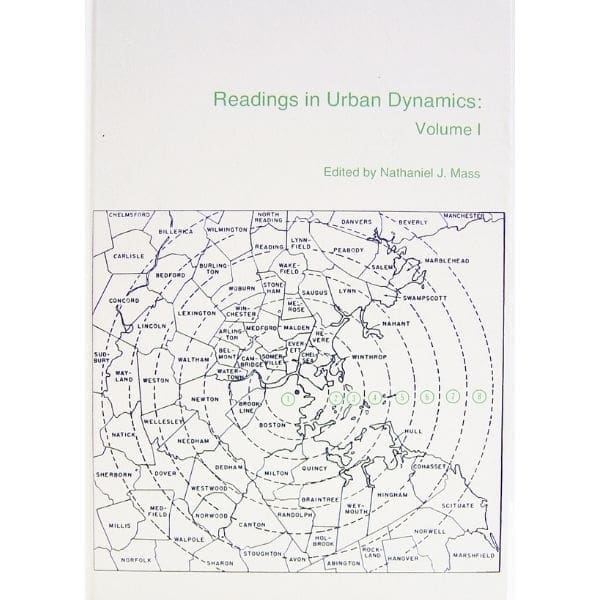$29
Tracing Connections shows how Systems Thinking can be used to transform education, business, public policy, and research. This book reveals how a new way of thinking can radically improve your ability to work through complex issues and uncover elegant solutions. It will leave you with a better understanding of what systems thinking is, who is using it, and why applying systems thinking is so important is this world of growing interdependence. Twelve of the world’s foremost systems thinkers share how they use this powerful thinking tool to change lives.
Description
Tracing Connections: Voices of Systems Thinkers Authors: Tracy Benson, James K. Doyle, Frank Draper, Diana M. Fisher, Ali Mashayekhi, John D. W. Morecroft, John L. Newman, Corey Peck, Steve Peterson, Barry M. Richmond, Khalid Saeed, Peter M. Senge, and Jeanine Skorinko. Editors: Joy Richmond, Lees Stuntz, Kathy Richmond, and Joanne Egner. Tracing Connections shows how Systems Thinking can be used to transform education, business, public policy, and research. This book reveals how a new way of thinking can radically improve your ability to work through complex issues and uncover elegant solutions. It will leave you with a better understanding of what systems thinking is, who is using it, and why applying it is so important is this world of growing interdependence. Twelve of the world's foremost systems thinkers share how they use this powerful thinking tool to change lives.- The Thinking in Systems Thinking: Eight Critical Skills, Barry Richmond, creator of STELLA and iThink -- Defines critical thinking skills that are necessary to evolve our thinking, learning, and communicating capacities.
- Barry Richmond's Influence on Systems Thinking: From Academia to Widespread Accessibility, Ali Mashayekhi, Sharif University of Technology -- An explanation of the role of Barry Richmond in the growth of the field.
- Systems Thinking for Anyone: Practices to Consider, Steve Peterson, Lexidyne, LLC -- Identifies many existing systems problems and discusses how systems thinking is needed to tackle such problems.
- Teaching by Wondering Around: Learning About the World Naturally, Frank Draper, Catalina Foothills School District -- Discusses how he has integrated systems thinking into his teaching of science to high school students.
- Changing School Culture: Creating Student-Centered Classrooms, Tracy Benson, Waters Foundation, Systems Thinking in Schools Project -- Uses classroom stories to describe applications of systems thinking skills.
- Modeling for High School Students: Teaching Critical Thinking through System Dynamics, Diana M. Fisher, Wilson High School -- Discusses the process of learning systems thinking. Provides examples of how students have used it and offers helpful tools for new practitioners.
- Romeo and Juliet in Brazil: Use of Metaphorical Models for Feedback Systems Thinking, John Morecroft, London Business School -- Discusses the spectrum of models from fisheries to Romeo and Juliet to global oil production.
- The Value of Critical Thinking Skills: Modeling Price and Inventory Dynamics, Corey Peck, Lexidyne, LLC -- Details a client engagement in which critical thinking skills were incorporated to provide a richer, more actionable understanding of inventory and pricing dynamics in a basic materials market.
- Finding System Dynamics: An Exploration in International Development, John L. Newman, The World Bank -- Describes the effectiveness of modeling to inform international development work.
- The Power of the Situation: Modeling Classic Experiments in Social Psychology, James K. Doyle, Khalid Saeed, Jeanine Skorinko, Worcester Polytechnic Institute -- Honors Barry Richmond's remarkable contribution in crossing interdisciplinary boundaries by highlighting how system dynamics can realistically interact with social/psychological models for use in future research and psychological education.
- Education for an Interdependent World: Developing Systems Citizens, Peter M. Senge, MIT and Society for Organizational Learning -- Focuses on a new kind of thinking to educate youth that addresses the interconnected social, economic, cultural, ecological, and global challenges the world faces. Discusses how our current education system must change utilizing a systems perspective. Peter Senge is also the Author of the classic book The Fifth Discipline: The Art and Practice of the Learning Organization.





